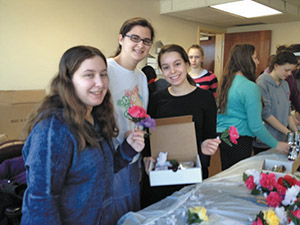


Mark Twain’s famous declaration about not letting school interfere with his education can sometimes ring true, even for those who experience positive, growth-oriented experiences in traditional educational settings. Indeed, the fact that students develop personally, religiously, and intellectually in significant ways in experiential settings (e.g., camp, youth groups, etc.) inspires schools to consider ways of incorporating ‘life experiences’ into the educational curriculum.
A way in which Ma’ayanot utilizes co-curricular programming to instill and encourage important life lessons is through its well-developed and comprehensive chessed program. The basis of the program is the requirement that each student must complete eight service projects over the course of the school year. While students are given great latitude in choosing their chessed activities, some basic guidelines exists; students cannot be paid for chessed activities and are encouraged to broaden their impact by choosing chessed activities that benefit non-family members.
In addition to this basic requirement, each year Mrs. Ivy Weiner, Ma’ayanot Chessed Coordinator, organizes a huge number of optional chessed activities aimed at further encouraging student volunteerism. She coordinates frequent lunchtime projects typically involving the creation of something for a particular community. Past projects include crafting cards for American and Israeli soldiers and games for hospitalized children.
Mrs. Weiner organizes clothing drives six to eight times each year, asking the students tp gather and distribute items for needy populations. They have collected coats, food, baby clothing, books, socks and glasses. Students have taken the initiative to organize tzedaka drives. Recently students oversaw a bake sale and donated the proceeds to the Leukemia and Lymphoma Society’s Pennies for Patients drive.
Pay-It-Forward, Ma’ayanot’s Homework Help Club, is a favorite among the students. Each Wednesday, nearly fifty Ma’ayanot students stay after school to provide one-on-one homework help for local elementary school children. A chessed opportunity that is particularly popular with the senior grade is Ma’ayanot’s yearly blood drive, open to students 17 and older and the broader community. This year’s drive, which took place on March 19th, was one of the most successful ever and resulted in 48 units of donated blood.
One highlight of Ma’ayanot’s chessed programming is Chessed Day, wherein the entire student body travel on half-day chessed trips. For this year’s mid-March Chessed Day, students chose from eight possible sites, including Chessed 24/7 (packaging food for bikiur cholim) in NY, The Rockleigh Hebrew Home, OHEL Day habilitation in Brooklyn, The JCC on the Palisades, The Hebrew Home in Riverdale, IVDU School for developmentally disabled adults in Brooklyn, AFYA (organizes the packing of medical supplies) in Yonkers, and Kittay House, a nursing home in the Bronx.
Ma’ayanot’s chessed programming is a success. As Mrs. Weiner explained, “the program benefits the students by instilling compassion for others and reinforcing the important Jewish value of giving of oneself to the community, but of course the community benefits as well.” Indeed, immediately upon completion of the Chessed Day trips, Mrs. Weiner received a call from one of the participating organizations inquiring as to when Ma’ayanot students might be able to return for a repeat visit. “I get this type of call all the time — the more we do, the more the community asks us to help.”












